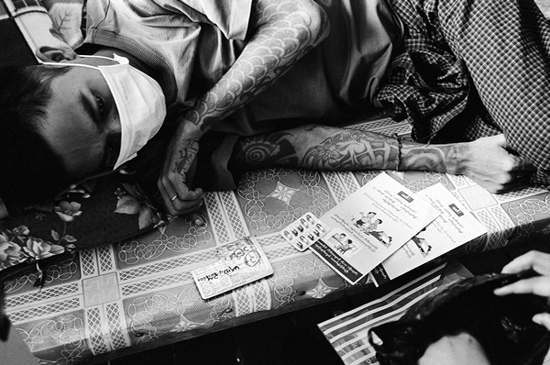A new MSF report warns that cancellation of global fund grants will have devastating effect in Myanmar.

Myanmar 2012 © Greg Constantine
A young man co-infected with HIV and TB at MSF's clinic in Yangon.
BANGKOK/NEW YORK, February 22, 2012—Tens of thousands of people living with HIV and tuberculosis (TB) in Myanmar are unable to access lifesaving antiretroviral therapy (ART), a dire situation exacerbated by the recent cancellation of a new round of funding from the Global Fund to Fight AIDS, TB, and Malaria, said the international medical humanitarian organization Doctors Without Borders/Médecins Sans Frontières (MSF) in a report released Wednesday.
In its report, "Lives in the Balance," MSF, the largest provider of HIV treatment in Myanmar, said that there are now 85,000 people in need of ART. In 2010, fewer than 30,000 people received treatment. MSF is currently treating more than 23,000 people living with HIV in Myanmar.
Of an estimated 9,300 people newly infected with multi-drug resistant tuberculosis (MDR-TB), only about 300 are receiving treatment. The MSF report details the devastating effect the cancellation of an entire round of funding from the Global Fund will have on the struggle to provide HIV and TB treatment in Myanmar. There will be no new funding to expand treatment for HIV or TB and its drug-resistant forms in Myanmar until 2014.
“Yet again, donors have turned their backs on people living with HIV and TB in Myanmar,” said Peter Paul de Groote, MSF head of mission in Myanmar. “Every day we are confronted with the tragic consequences of these decisions: desperately sick people and unnecessary deaths.”
Between 15,000 and 20,000 people living with HIV die every year in Myanmar because of lack of access to lifesaving ART. TB prevalence in Myanmar is more than three times the global average and Myanmar is among the 27 countries with the highest MDR-TB rates in the world. Like non-resistant TB, MDR-TB is easily transmitted through the air and can infect perfectly healthy people, but requires far more complex and lengthy treatment.
"Without increased availability of treatment, HIV and TB will continue to spread unchecked in many areas,” said MSF’s Dr. Khin Nyein Chan. “The time to treat is now. There is a real opportunity here; HIV prevalence rates in Myanmar are relatively low. It is lack of access to treatment that makes it one of the most serious epidemics in Asia.”
Myanmar, the least developed country in Southeast Asia, receives some of the least official development assistance in the world. With political reform in Myanmar resulting in greater international engagement with the country, an opportunity now exists to put access to treatment for people living with HIV and TB at the top of donor priorities, said MSF.
“I want to see treatment be accessible for every patient in Myanmar,” said Zaw Zaw a female 30-year-old MSF patient, whose husband and youngest child are also HIV positive and receive ART from MSF. “I want people to stay alive by taking treatment, like us.”
Myanmar suffers from an underfunded state healthcare system. While there are promising efforts to increase the health budget, it will be years before the country has a fully comprehensive healthcare system.
“The math is simple,” said de Groote. “Rapidly scaling up HIV and TB treatment now will prevent further transmission and save both lives and money. Fewer people infected means fewer lives lost, and fewer people in need of treatment. It is critical that donors help Myanmar ensure that more patients across the country receive treatment for HIV and MDR-TB.”
MSF currently treats more than 23,000 HIV patients in Myanmar. An additional 6,000 people will be enrolled in MSF clinics in 2012. Worlwide, MSF treats more than 170,000 people living with HIV.




